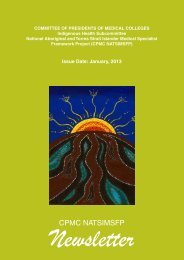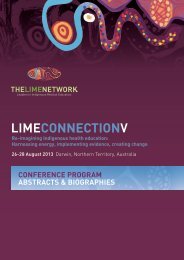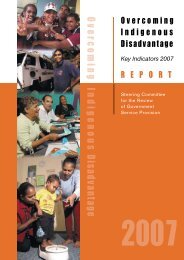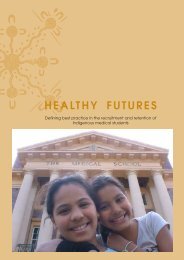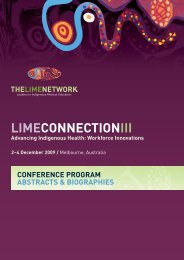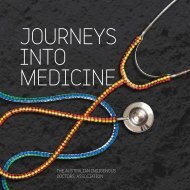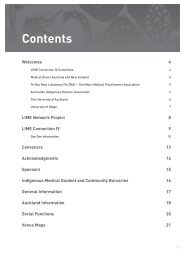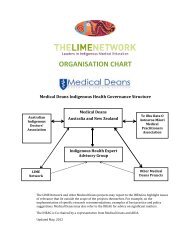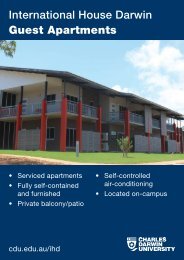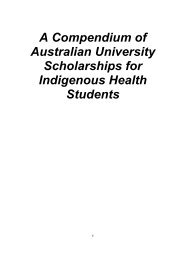View - LIME Network
View - LIME Network
View - LIME Network
You also want an ePaper? Increase the reach of your titles
YUMPU automatically turns print PDFs into web optimized ePapers that Google loves.
INDIGENOUS HEALTH POSITION PAPER4.1 Contribution to the Indigenous Health WorkforceThe College aims to improve the representation of Indigenous Fellows and Trainees, to close the gap insurgical workforce under-representation. To achieve this the College acknowledges it needs to enrol andtrain increasing numbers of Indigenous doctors in its Surgical Education and Training program. Howeverto do this there first needs to be an increase in the number of Indigenous doctors trained by Australianand New Zealand Universities. Whilst the College has no ability to influence University selection, activerecruiting amongst current indigenous doctors is a priority.The College will consider within its Indigenous Health Plan how it could achieve the ambition of at least50 Indigenous surgeons in Australasia in 10 years4.2 Training in Cultural CompetenceTo ensure better health outcomes for Australia and New Zealand’s Indigenous populations the Collegewill ensure that all surgeons are properly trained and competent to provide the highest standards ofculturally appropriate surgical care to Indigenous patients and their families. Health care delivery toIndigenous communities must be provided in an acceptable manner that observes social and culturalsensitivities.Therefore there is a need to develop and deliver educational programs and materials, such as trainingmodules and support for surgeons that focus on Indigenous health issues and cultural awareness.In 2006 the College worked collaboratively with the Royal Australian and New Zealand College ofObstetricians and Gynaecologists (RANZCOG), on an Australian Government funded project to developtraining modules in Indigenous cultural safety, for Indigenous and non-Indigenous Fellows, Trainees andInternational Medical Graduates in Australia.On the strength of this experience, the College will aim to:• Recognise training in Indigenous health care• Recognise training time spent with Indigenous populations, including community healthcentres• Directly collaborate with governments on developing and implementing training programsin effective delivery of healthcare to Indigenous patients and their families.• Seek government support in both countries and all states to fund such programsThe College commits to providing resources for training in cultural competence for all its Trainees andFellows. The training curriculum of the College will be enhanced to include modules in:• Communication with Indigenous communities, families and patients• Structuring the patient journey through primary health care and onto hospital to beculturally friendly and less intimidating to Indigenous patients and their families.These enhancements will occur in the curriculum for all specialties in Surgical Education and Training,under the competencies of:• Professionalism• Communication• Health Advocacy• Management and Leadership.The College is committed to providing funds to train the surgical workforce in Indigenous health issuesand encourages and challenges governments to support these activities with financial contribution.4.3 Building PartnershipsThe College acknowledges that there have been numerous fora looking into the health and welfare ofIndigenous communities of Australia and New Zealand, and that the recommendations emanating fromsuch fora need to be recognised.Royal Australasian College of SurgeonsManual:Division:Subject:Guidelines and Position PapersFellowship and StandardsINDIGENOUS HEALTH POSITION PAPERRef. No.:Approval Date:Review Date:FES_FEL_001June 2009June 2012Page 4 of 9



